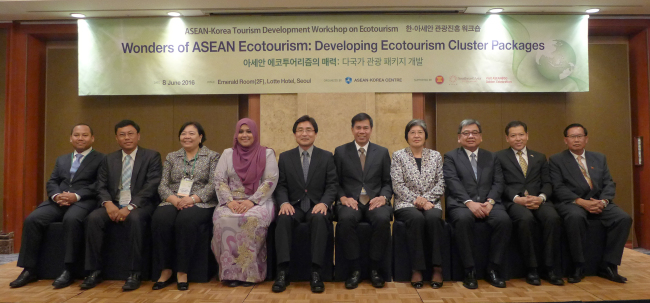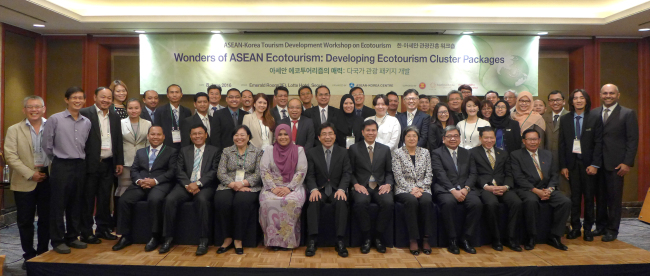The ASEAN-Korea Center last week held a seminar to explore opportunities and challenges in ecotourism in Southeast Asia, a region that aims to foster sustainable and inclusive travel.
Part of the second ASEAN-Korea Tourism Development Workshop, the venue gathered over 100 representatives from the government, private sector and academia to discuss recent trends and possibilities in the industry.
The Association of Southeast Asian Nations is promoting a form of tourism environmentally nondestructive, socially responsible and commercially sustainable.
Under the “Pakse Declaration on ASEAN and Tourism Corridors” and “ASEAN Ecotourism Strategic Plan” scheduled to be adopted this year, it has formulated cluster and corridor packages to sell the region as a single destination.

“The ASEAN region is blessed with rich, abundant resources and ecotourism wonders,” said ASEAN-Korea Center secretary-general Kim Young-sun in a speech at Lotte Hotel in Seoul on Wednesday. “Involving local communities and enhancing people’s capacities are essential to ecotourism, in keeping with the essence of the ASEAN community-building process.”
According to the International Ecotourism Society, the industry is projected to grow and assume one-quarter of the world’s tourism market over the next six years, generating $470 billion.
Marking its gold jubilee, the ASEAN has designated next year with the campaign “Visit ASEAN at 50: Golden Celebration.” South Asia received over 100 million tourists last year, generating $110 billion in revenue.
“Many tourists coming to ASEAN these days are forgoing traditional package tours and chain hotels and immersing deep into ecotourism instead,” said Benito C. Bengzon Jr., chair of the ASEAN sustainable and inclusive tourism development committee. “Ecotourism, which is a form of responsible and ethical travel, minimizes environmental impact and benefits local communities. As a niche market, it has grown steadily in recent years, becoming an integral part of our tourism.”
ASEAN recognizes the need to ensure the sustainability of natural resources and wildlife, he stressed, adding that collaboration across national boundaries is required.
As an example, he cited the development of the Greater Mekong Region, which has incorporated vast swaths of territories using subregional strategies.

Thai Ambassador Sarun Charoensuwan pointed out that tourism has long been an integral part of South Asian economies, creating wealth and encouraging exchange of contact and culture.
To protect the environment damaged by tourism and preserve community heritage, Bangkok has devised a campaign of “7 greens -- green heart, green logistics, green attractions, green activities, green communities, green services and green plus.”
YB Datuk Mas Ermieyati Binti Samsudin, Malaysian deputy minister of tourism and culture, noted that ASEAN aims to position various tourism -- ecotourism, marine tourism, medical tourism and cultural tourism -- high in the development agenda, as the region is full of cultural diversity and biodiversity.
In Malaysia, she said, tourism has been identified as one of 12 national key economic areas for development. Twelve pilot projects have been initiated, including one that promotes the country as a “global biodiversity hub.”
Malaysia has many ecotourism assets, including the Royal Belum State Park; Gunung Mulu National Park -- UNESCO World Heritage Area; Perhentian Island in Terenggau; Langkawi Island; and Pulau Tioman Marine Park.
Through homestay arrangements, over 390,000 tourists last year experienced traditional lifestyles in Malaysia’s rural villages, contributing $8.7 million to the local economy. They also planted some 17,000 trees as part of a tree-planting program.
“Lao PDR (Laos) has diverse cultures, customs and languages, which have been handed down from our ancestors over thousands of years,” said Sounh Manivong, director general of tourism development department at the Laos Ministry of Information, Culture and Tourism. “We also have spectacular natural resources and archaeological sites. Our government is doing its upmost to develop infrastructure across the country to link these attractions.
Tourists can visit Luang Prabang -- an ancient city in northern Laos and winner of top city gold award by U.K. travel magazine Wanderlust; Wat Phou Champasak -- ruins of a Khmer Hindu temple complex in southern Laos along the Mekong River and a UNESCO World Heritage Site; and caves of Vieng -- an awe-inspiring natural wonder situated in a blue lagoon. Outdoor adventurers can go trekking, rafting, kayaking and caving across 18 provinces.
By Joel Lee (joel@heraldcorp.com)
-
Articles by Korea Herald



![[AtoZ into Korean mind] Humor in Korea: Navigating the line between what's funny and not](http://res.heraldm.com/phpwas/restmb_idxmake.php?idx=644&simg=/content/image/2024/04/22/20240422050642_0.jpg&u=)


![[Exclusive] Korean military set to ban iPhones over 'security' concerns](http://res.heraldm.com/phpwas/restmb_idxmake.php?idx=644&simg=/content/image/2024/04/23/20240423050599_0.jpg&u=20240423183955)
![[Herald Interview] Why Toss invited hackers to penetrate its system](http://res.heraldm.com/phpwas/restmb_idxmake.php?idx=644&simg=/content/image/2024/04/22/20240422050569_0.jpg&u=20240422150649)
![[Graphic News] 77% of young Koreans still financially dependent](http://res.heraldm.com/phpwas/restmb_idxmake.php?idx=644&simg=/content/image/2024/04/22/20240422050762_0.gif&u=)







![[Exclusive] Korean military to ban iPhones over security issues](http://res.heraldm.com/phpwas/restmb_idxmake.php?idx=652&simg=/content/image/2024/04/23/20240423050599_0.jpg&u=20240423183955)



![[Today’s K-pop] Ateez confirms US tour details](http://res.heraldm.com/phpwas/restmb_idxmake.php?idx=642&simg=/content/image/2024/04/23/20240423050700_0.jpg&u=)